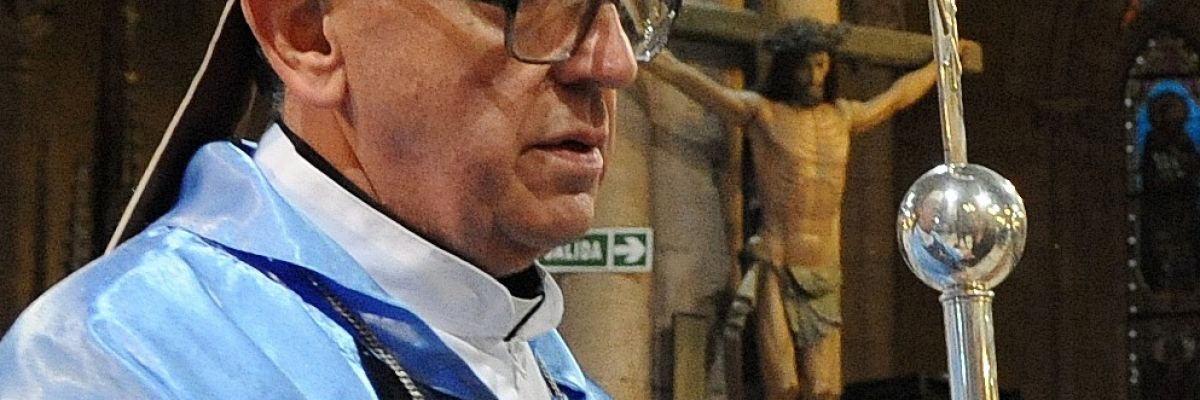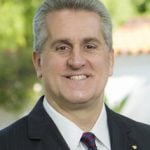
If anyone says to you, “I told you so!” with regard to the election of Pope Francis, he needs to go to confession. I don’t think anyone saw this one coming. Yes, the word is then-Cardinal Bergoglio finished second in the running in the last conclave (2005), but that did not seem to give anyone prescience when it came to the outcome of this conclave. Because of his age alone (76) the general consensus was he was a long-shot at best.
Looking back now in the distant past of, oh, a little less than a day, we can already see how the Holy Spirit, once again, knows what he’s doing! This is not to say the Holy Spirit always gives us the very best and most intellectually and morally qualified to be pope. Sometimes we get what we deserve instead of what we may want. Case-in-point, see the late fifteenth century “Borgia” popes, e.g., Alexander VI! However, I would argue Cardinal Archbishop Jorge Bergoglio is a near-perfect pick (no perfection this side of heaven, folks!).
Here is a quick run-down of his CV:
He studied and received a master’s degree in chemistry from the University of Buenos Aires before he discerned his calling to the priesthood. He would then study to become a Jesuit priest at the Jesuit seminary of Villa Devoto. Thus, he has a scientific background in an age where science is so often worshipped as the end-all-be-all of epistemology.
He earned a degree in philosophy from the Catholic University of Buenos Aires where he also apparently studied literature and psychology. Between 1964 and 1965 he taught literature and psychology on a high school level in the province of Santa Fe. Later, in 1966, he would teach literature and psychology at the Colegio del Salvador in Buenos Aires. Thus, he has a wide-ranging educational background.
On Dec. 13, 1969, he was ordained a Jesuit priest and in 1973 became master of novices as well as a professor of theology at the Seminary of Villa Barilari in San Miguel. He would then be elected as superior of the Jesuit province of Argentina where he would serve from 1973 to 1979.
In 1992 he was ordained a bishop and appointed Auxiliary Bishop of Buenos Aires followed by being named Coadjutor Archbishop of Buenos Aires on June 3, 1997. On Feb. 28, 1998, he would be installed as the Archbishop of Buenos Aires. He was created Cardinal by Pope John Paul II in 2001. Thus, Pope Francis has a wide range of pastoral experience as both provincial in his religious order and as a bishop on the diocesan level.
Pope Francis has both a licentiate in Philosphy and a doctorate in Theology. He was rector of the seminary in San Miguel where he had previously studied and he served there from 1980 until 1986. He was also named ordinary for the ordinariate of Eastern Catholics in Argentina where he served for 15 years due to the fact that the Eastern Churches did not have their own ordinary. Not only does this translate to our Pope being bi-ritual liturgically, but he would have keen insight into matters both theological and pastoral between East and West.
As a Cardinal, Bergoglio was appointed to several administrative positions in the Roman Curia including the Congregations for Divine Worship and the Discipline of the Sacraments, the Clergy, Institutes of Consecrated Life and Societies of Apostolic Life, the Pontifical Council for the Family and the Commission for Latin America. So he knows his way around the Vatican as well.
This is not meant to be an exhaustive accounting of our Holy Father’s resume, but it does not take rocket science to figure out he has an exceptional educational and pastoral background. But perhaps most impressive of all is what we know of the good Cardinal’s orthopraxy. He has been on record as describing so-called same-sex “marriage” as “demonic in origin” and he received criticism from the President of Argentina for his statement equating homosexual couples adopting children to “discrimination against children” who have an inherent right to a mommy and a daddy.
In 2010, he campaigned against legislation by the Argentine Government to allow same-sex marriage, though ultimately unsuccessfully, calling it a “real and dire anthropological throwback.” And yet, we also know that Cardinal Bergoglio visited AIDS patients washing 12 of these suffering souls’ feet. He was photographed humbly bowing and kissing one such suffering patient’s foot. Obviously, the good Cardinal’s orthodoxy did not somehow translate into his being pastorally insensitive as is so often the caricature.
He commented on the matter of openly dissenting Catholics receiving communion saying,
We should commit ourselves to ‘eucharistic coherence’, that is, we should be conscious that people cannot receive Holy Communion and at the same time act or speak against the commandments, in particular when abortion, euthenasia, and other serious crimes against life and family are facilitated. The responsibility applies particularly to legislators, governors, and health professionals.
This is impressive to say the least. Our Holy Father is already being lambasted as a “radical right-winger” in some circles. And yet, for those who would want to paint him as some good ‘ole American-style neo-conservative, we also know that he has worked closely with the Italian religous movement called “Communion and Liberation,” which also had the backing of both Pope John Paul II and Benedict XVI. This is a movement that seeks to evangelize through impacting the culture from the inside out, focusing to a great extent upon, in the words of our new Pope, “unjust economic structures that give rise to great inequalities.” It is an understatement to say Pope Francis has a heart for the poor completely in line with our Lord’s and the Church’s historical preference for the poor.
We still do not know for sure whether he is taking the name “Francis” in honor of St. Francis of Assisi, St. Francis Xavier or if it is some other Francis. It appears he is following St. Francis of Assisi. We’ve read differing accounts so far. But we know this. As the Cardinal Archbishop of Buenos Aires, Bergoglio refused to live in the bishop’s mansion, choosing a small apartment instead, refused a driver, choosing instead to take the bus to work, and refused a chef to cook his meals, choosing to cook his own meals. He has been a model for the evangelical counsels in good Franciscan and in good Jesuit tradition. He is truly a man who walks in the footsteps of our Lord and Savior Jesus Christ. Though I originally would have bet he was taking the name of the great Jesuit St. Francis Xavier, my money would now be on St. Francis of Assisi. We’ll see.
Our Holy Father Pope Francis, I believe, is a man chosen by God “for such a time as this.” His educational background, orthodoxy and unwavering loyalty in acting in accord with that orthodoxy to Church teaching, coupled with his humility, simplicity and heart for the poor leads this apologist, for what it’s worth, to believe we could not have a better Pope better suited to face the challenges that lie ahead in a 21st century world in desperate need of the fullness of the gospel of Jesus Christ.



